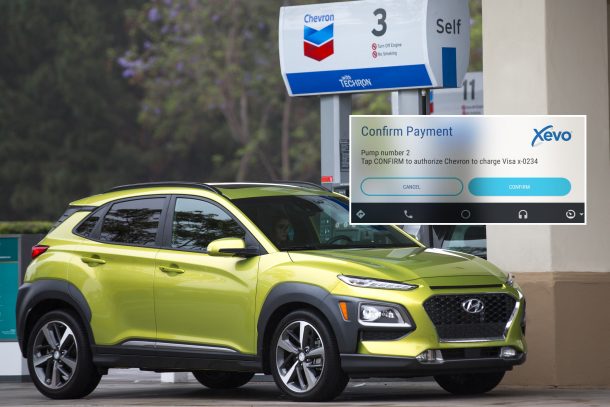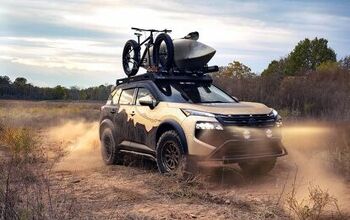The Car As a Wallet: Hyundai Adds Food, Gas, Parking for In-Car Payment Plan

Corporate partnerships and integrated purchasing solutions are all the rage right now in the auto industry. While it’s easy to miss the appeal, as credit cards are pretty easy to use when cash isn’t an option and most modern phones have similar applications, car-based transitions are on the rise. Now, Hyundai’s joining Xevo to provide its own branded in-car purchasing platform.
Like similar services, Hyundai owners will be able to sync their credit card with the vehicle and use it to locate and buy food, fuel, and parking (from participating companies). Also under development is the Hyundai Digital Wallet, “which stores a customer’s payment information and facilitates secure processing, for a seamless checkout experience to enable in-car commerce.”
Hyundai hasn’t established an official launch date — or nailed down the final design — but it insists the system is coming. Initial partners include Chevron and Texaco-branded gas stations, Applebee’s To Go and ParkWhiz. Out of the three, the parking solution seems the most useful by far. But if you absolutely refuse to get out of your seat to procure a bundle of mozzarella sticks, Hyundai (like GM) will eventually have you covered.
“We are always learning and exploring with Blue Link, having worked with technologies like Google Glass, Amazon’s Alexa, Google Assistant, Wear OS and Apple Watch,” said Cason Grover, a senior group manager at Hyundai Motor America’s vehicle technology planning division. “Usage-based insurance and in-vehicle payment can offer savings and convenience to our customers, and we look forward to offering these services.”
However, like all connected car news, there’s a dark smudge we have to address. While it wasn’t directly mentioned in this particular release, Hyundai also partnered with data firm Verisk earlier in the year. As a result, the automaker will provide the analytics company with driving data from its connected car owners. That information will then be sent to insurance companies, provided the driver consents (or neglects to opt out of the agreement).
“Our alliance with Verisk will enable new value-added services for our customers,” said Manish Mehrotra, director of digital business planning and connected operations for Hyundai Motor America. “Hyundai customers will have access to their portable “Verisk Driving Score,” which can lead to discount offers on UBI programs and support driver feedback that helps improve their driving.”
This could also lead to insurance companies trying to mandate this kind of thing in the future, penalizing motorists who don’t want their information shared (or who engage in the occasional bout of spirited driving). It’s just speculation for now, but we don’t love the precedent this sets.
It’s nothing to smile about.
[Images: Hyundai]

A staunch consumer advocate tracking industry trends and regulation. Before joining TTAC, Matt spent a decade working for marketing and research firms based in NYC. Clients included several of the world’s largest automakers, global tire brands, and aftermarket part suppliers. Dissatisfied with the corporate world and resentful of having to wear suits everyday, he pivoted to writing about cars. Since then, that man has become an ardent supporter of the right-to-repair movement, been interviewed on the auto industry by national radio broadcasts, driven more rental cars than anyone ever should, participated in amateur rallying events, and received the requisite minimum training as sanctioned by the SCCA. Handy with a wrench, Matt grew up surrounded by Detroit auto workers and managed to get a pizza delivery job before he was legally eligible. He later found himself driving box trucks through Manhattan, guaranteeing future sympathy for actual truckers. He continues to conduct research pertaining to the automotive sector as an independent contractor and has since moved back to his native Michigan, closer to where the cars are born. A contrarian, Matt claims to prefer understeer — stating that front and all-wheel drive vehicles cater best to his driving style.
More by Matt Posky
Latest Car Reviews
Read moreLatest Product Reviews
Read moreRecent Comments
- Daniel J Cx-5 lol. It's why we have one. I love hybrids but the engine in the RAV4 is just loud and obnoxious when it fires up.
- Oberkanone CX-5 diesel.
- Oberkanone Autonomous cars are afraid of us.
- Theflyersfan I always thought this gen XC90 could be compared to Mercedes' first-gen M-class. Everyone in every suburban family in every moderate-upper-class neighborhood got one and they were both a dumpster fire of quality. It's looking like Volvo finally worked out the quality issues, but that was a bad launch. And now I shall sound like every car site commenter over the last 25 years and say that Volvo all but killed their excellent line of wagons and replaced them with unreliable, overweight wagons on stilts just so some "I'll be famous on TikTok someday" mom won't be seen in a wagon or minivan dropping the rug rats off at school.
- Theflyersfan For the stop-and-go slog when sitting on something like The 405 or The Capital Beltway, sure. It's slow and there's time to react if something goes wrong. 85 mph in Texas with lane restriping and construction coming up? Not a chance. Radar cruise control is already glitchy enough with uneven distances, lane keeping assist is so hyperactive that it's turned off, and auto-braking's sole purpose is to launch loose objects in the car forward. Put them together and what could go wrong???




































Comments
Join the conversation
“Jane! Stop this crazy thing, Jane!” - George Jetson
Guess it may appeal to the post millennial generation (convenience; can't be bothered to pull out a CC), but something like this has the potential to create a lot more problems.